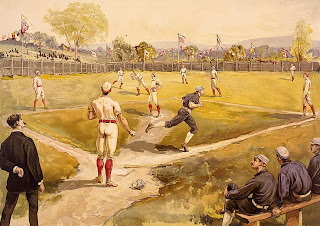Dodge Ram gave us an academy award-winning performance with their Super Bowl ad this year. I was wondering how I could tie this into a baseball story when I remembered an incident at AT&T Park a few years ago. I was sitting in the stands, anxiously awaiting the start of a SF Giants game,when I heard some fans behind me chatting about the new pitcher, Madison Bumgarner. It went something like this, “Yah, he doesn’t belong here. He belongs back on the farm. I heard he gave his wife a cow (actually it was a prize bull calf) for their wedding present”. This was following by hysterical laughter and hoots and hollers from the enthusiastic, but misguided, fans. The little incident would have probably ruined the game for me, but Bumgarner pitched a masterpiece and he spoke for himself, saving me from having to turn around and give them my two cents worth.
So I’m wondering how many other pro baseball players lives began down on the farm. I can tell you emphatically there were a lot of them, these young kids from the midwest farms and others who grew up with that sense of hard work, physical discipline with a sense of community. It wasn’t all about them, it was about getting a job done. And it still is. I remember listening to an interview with Bumgarner before he pitched his first World Series Game. When asked if he was nervous and whether this was the most exciting thing he’d ever been through, Bum answered with that slow southern drawl, something like “Well, I dunno. I pitched in the high school world series and I did okay there. I was pretty nervous then and I don’t see how it can be any worse pitching here today.” In other words, in his mind, he didn’t see any difference in pitching in high school or the World Series. In his mind he had a job to do. That was it. Don’t you just love it?
I started researching on-line to see how many farmers I could come up with and immediately found Sergio Romo, the SF Giants reliever who aced this year’s World Series. The title of the article was “In Sergio Romo’s Small Hometown, No. 1 Crop is Pro Baseball Players“, and it was written by Valerie Hamilton, California Report. Here’s an excerpt:
“Brawley would be probably like a slightly bigger version of Mayberry, although not quite as nice,” says Rudy Seanez, who pitched in the major leagues for 17 years, ending in 2008. Like Romo, he grew up in Brawley. So did Alan Fowlkes, who pitched for the 1982 Giants. And so did Sid Monge, who pitched in the 1970s and 80s. It turns out Brawley’s sugar beets and melons have some competition for the town’s top-produced crop. The town, and the Imperial Valley around it, have sent more than 20 players to the major and minor leagues.
I didn’t spend any more time looking for baseball farmers. I was satisfied that my instincts were justified, but it’s definitely a subject for another blog. Don’t you just wonder what the percentage of those old-time ball players born down on the farm might be? I imagine the numbers are staggering, huge!
Thank you Dodge Ram for giving us the best Super Bowl advertisement we’ve seen in a long time. It goes really well with the Budweiser “Clydesdales”, because, after all, what could be more down on the farm than that?
Related articles
- Baseball’s Sergio Romeo, Son of Migrant Workers (lawprofessors.typepad.com)
- Super Bowl ‘Farmer’ Commercial Explained: Where Ram’s ‘God Made A Farmer’ Ad Came From (huffingtonpost.com)
- apoplecticskeptic: The Latino-free Dodge spot was apparently… (evangotlib.tumblr.com)












It’s probably reasonable to assume that, the further you go back in time, the higher the proportion of players were brought up on farms. Rural areas, though, have been losing people to the cities and suburbs for over a hundred years now. I would guess that the number of current ballplayers who were brought up on farms would be pretty small.
Bob Feller comes to mind as a farm boy. So does Smoky Joe Wood. I’m sure there’re lots of others.
Nice post,
Bill
LikeLike
Thanks Bill. Maybe it’s the values such as hard work and family that I associate with the farmers and want to hang on to. Unfortunately, as you suggested, it’s becoming a thing of the past.
LikeLike
Fortunately, though, I think there are still lots of families that do their best to pass along those values to their children, even within the cities. It’s just harder to do nowadays primarily due to all the commercialism that has completely engulfed our society.
LikeLike